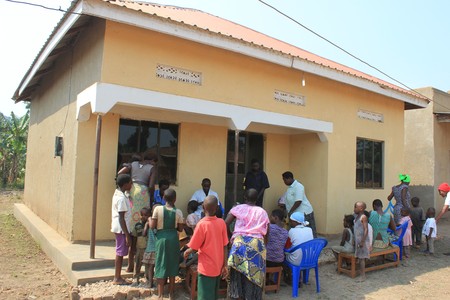
100% of donations to
the projects.
break free of
aid dependency.

Poverty and illiteracy dominate in the region, so that many families of, on average, seven children don’t have access to affordable medical care nor are educated about medical topics such as HIV, malaria, and family planning. Child Need Africa has been combating these problems with their mobile medical and educational program since 2007. Through our support, they have established a medical clinic at the heart of a particularly disadvantaged region. Ever since, the demand for their services has been overwhelming, to the extend that they will require additional sources of income to fund their medical and educational care in the long term.
The Social Context in Uganda
The Katerera area in Rubirizi District (formally Bushenyi District), with an estimated area of 78 square miles, has a population of over 40,000. Of these, 42% are children born to mainly illiterate parents. The average household here has seven children aged two months to fourteen years.
Majority of the population are peasants, and many live in abject poverty. According to the Uganda National Household Survey, two in seven households in Bushenyi live in poverty, meaning they subsist on less than $495 annually for families of nine on average.
HIV/AIDS is closely concomitant with the poverty in the region and takes its toll on the communities. Records from Bushenyi Hospital, where HIV sentinel services are done for pregnant women, show that 12% (approximately 4,800 people of those who sought VCT there) are HIV positive. Compared to other areas in Uganda, this is an unacceptably high rate of HIV, which leaves in its wake unprecedented numbers of orphans and vulnerable children.
Children in Katerera are highly vulnerable to diseases due to a number of factors such as poor nutrition, poor sanitation, tropical diseases, limited or lacking medical services, and harmful cultural practices. Those born with HIV suffer from opportunistic infections. The children’s frequent ill health forces them to attend school irregularly.
Further factors limiting their access are the long distances to the health centers, the long hours of waiting, patients often being turned away without having been treated or having obtained their medicine, and instances of discrimination by the health workers in public facilities.
The Nonprofit Child Need Africa
Child Need Africa was founded in 2007 as a nonprofit, nongovernmental, unpolitical, child-centered, and community-based organization to serve the rural communities in the Western Uganda with timely access to quality medical services for disadvantaged children and with household- and community-level educational programs.
One of Child Need Africa’s core programs has been the deployment of a mobile medical unit to various uncovered areas in order to bring medical facilities to the door step. This program serves the greatest number of infants who are in need of medical care by removing the mentioned barriers to health care as well as being a catalyst for community involvement in health issues.
Particular objectives are the counseling and guidance of children and women suffering from HIV and women with unwanted pregnancies, whereby the aim is to educate the beneficiaries about the various choices available for them and to help them overcome the challenges they are faced with; community-based education on issues of sanitation, personal hygiene, nutrition education, family planning, HIV prevention, prevention of mother-to-child transmission of HIV, human rights, and much more; and the delivery of basic health care services to children including immunization, deworming, and vitamin A supplementation.
The Performance of the Clinic
In 2010, Child Need Africa made plans and wrote a proposal for establishing a clinic as base for their medical and community services while also extending their mobile outreach program. Over two years, Your Siblings, with great support from Bronies for Good, completed the funding of the project as detailed on the pages of the project A Clinic in Uganda. In early 2013, Child Need Africa had completed the building and obtained all certifications, so that the clinic could launch.
The response of the local communities was overwhelming. The need for affordable medical services was greater even than the leading physician Dr. Mawanda John Bosco had estimated in 2010. According to his tallies, 150 families have regularly used their medical services by late 2013, and hundreds more have been tested for HIV and other diseases.
Most of these patients would not otherwise have been able to obtain any medical care, predominantly for financial reasons. As a side effect, the fraction of patients who were able to pay for their medicine was smaller than Child Need Africa had estimated. This development was compounded with economical issues. The project was based on prices and estimates that were current in 2010, but during the almost three years of fundraising and construction, almost all actual prices rose, sometimes beyond the scope of the security margins. Especially prices for transportation exploded during the early phases of construction and certification.
To offset these greater expenses, Child Need Africa devised strategies for buying suitable items of medication in greater quantities at discounted prices. They’re also planning to move from several full-time staff to one full-time employee and further assistants that are hired on a case-by-case basis in particular for outreach programs. Finally, they will schedule these outreach programs, where most patents are teated free of charge, strictly in accordance to the funds available to them to not suffer any monthly deficits.
For a snapshot of the financial situation, see our blog post on the project launch.
The Goal of the Support Project
Sustainable operation, however, would require a marked curtailment of their services to the community despite these optimizations—except if an additional income-generating project can be established to offset their expenses, much like the guest house we funded for the Another Hope orphanage.
After several months of research, Child Need Africa proposed this project in its current form. Once the funding is complete, the organization will tap into the flourishing real estate market by buying a house near the capital Kampala, another smaller project will fund renovations, and then the tenants will pay for medicine and other supplies for the clinic with their rent.
Child Need Africa reviewed five houses that are for sale in lucrative regions in the suburbs of Kampala. They did background checks on the owners to ascertain their legitimacy and to find out why they decided to sell the houses. To that end, they also interviewed family members and neighbors. Next, they negotiated prices for each of the houses and assessed the extend to which they deeded to be renovated.
One of these houses was particularly interesting. It has six rooms and is located less than eight miles from the city center. With the other houses requiring similar or greater levels of renovation at higher prices, we decided to base the project on this one.
Since, however, it is possible that the house will be sold by the time the fundraising is completed, Child Need Africa is prepared to look for a similar house at the same or a lower price counting the security margin. Possible donations in excess of the price for the new house will benefit the renovations.
Key Distinctions of the Project
- The aim of the project is to allow Child Need Africa to operate their clinic sustainably.
- Child Need Africa is a nongovernmental nonprofit organization.
- Child Need Africa is also a local organization, run by Ugandans.
- Our accounting data and the funding progress are transparent in that they are available on our website. We also welcome anyone to visit the clinic itself.
- From the medical situation in the Rubirizi District the urgency of the project is evident.







